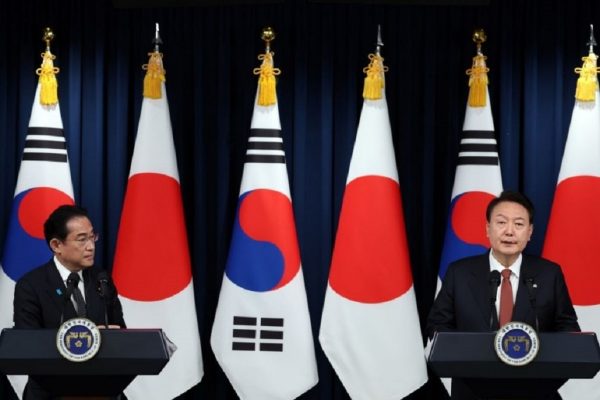Since his inauguration in May 2022, Yoon has eagerly sought to improve the bilateral relationship with Japan, which deteriorated under the previous Moon Jae-in and Shinzo Abe administrations. He has continuously referred to Japan as a cooperative partner and emphasised the need for a future-oriented bilateral relationship.
In early 2023, Yoon’s government proposed a third-party compensation scheme for South Korean victims of forced labour during the Japanese colonial era. Voluntary contributions from South Korea’s private sector will fund the compensation money. This aims to alleviate the Japanese government’s outcry over two 2018 South Korean Supreme Court rulings that ordered Nippon Steel Corporation and Mitsubishi Heavy Industries to financially compensate their South Korean victims.
This helped Yoon win favour with the Japanese government, culminating in a summit in Japan in March 2023. Kishida’s reciprocal visit to Seoul on 7–8 May also signified the revival of ROK–Japan shuttle diplomacy, which has been dysfunctional since 2011.
Public opinion polls in both South Korea and Japan suggest that the time is ripe for warming relations. A 2022 joint public opinion poll by South Korean newspaper Hankook Ilbo and Japanese newspaper Yomiuri Shimbun found that a substantial percentage of respondents in both countries believed the bilateral relationship would improve. South Korean respondents’ level of trust towards the Japanese was found to be at its highest since 1995. A poll conducted by Mainichi Shimbun after Yoon’s visit to Japan shows greater Japanese expectations of improved bilateral relations and a positive evaluation of the South Korean government’s compensation mechanism.
But the desire for reconciliation and how to achieve it are two different issues. In March, Yoon’s disapproval rating was 58 per cent while his approval rating was 34 per cent, consistent with his approval rating hovering in the low 30s since July 2022. Key reasons for this disapproval were relations with Japan and the problem of compensating forced labour victims.
The same poll found that 59 per cent of respondents oppose Yoon’s proposed compensation mechanism because it does not demand an apology or reparations from Japan. 64 per cent of respondents believed that South Korea should not rush into reconciliation without a change in Japan’s attitudes. Another 85 per cent believed that the Japanese government is unrepentant of its colonial past.
These polls demonstrate that while South Koreans have begun to trust Japan more, have a positive perspective of the Japanese people and are eager for the bilateral relationship to improve for economic, civilian and security reasons, they are unwilling to concede their position on historical conflicts.
As the resolution of historical conflicts is a necessary condition for bilateral reconciliation, it is concerning for ROK–Japan relations that an overwhelming majority of South Koreans lack confidence in Japan’s sincerity in atoning for historical wrongs. Despite the abundance of apologies given by top Japanese leaders in past decades, there have been just as many statements that have sanitised colonial history and dismissed South Korean victims’ accounts.
A key task for Yoon and his government is to bridge this gap between the South Korean people and the Japanese government. The government should facilitate a compensation mechanism that procedurally includes the opinions of the forced labour victims and respects the pain of victims of the colonial period and their bereaved families. Given that Yoon’s proposed compensation mechanism does not require Japanese companies to contribute to the fund, Yoon must ask the Japanese government to actively encourage Japanese companies to match South Korean companies’ donations.
Yoon must also request that the Japanese government go beyond inheriting the discourse of previous administrations and demonstrate sincerity and remorse in specific language that will not be contravened by subsequent leaders. The Japanese government could establish its acknowledgement of past wrongdoings and acceptance of responsibility as an official and immutable policy. The Japanese government’s acceptance of legal liability for wartime atrocities would also be a decisive step towards reconciliation.
This is not to suggest that the consent of the South Korean people is the last missing piece in ROK–Japan reconciliation. Much should be done to bridge the trust gap between the Japanese people and the South Korean government as well, given the fallout from the breakdown of the 2015 Comfort Women Agreement between the former Park Geun-hye and Abe administrations.
The former South Korean Moon administration dissolved the Reconciliation and Healing Foundation — a product of the agreement to make reparations to comfort women survivors — after his taskforce found that former president Park made backroom arrangements with former Japanese prime minister Abe that were not disclosed to the public. Future administrations can prevent such revocation in ROK–Japan relations by adopting a transparent and inclusive process of domestic consensus building that includes various stakeholders in Korean society, rather than just the government level. This could assure the Japanese government and public that the improvement of bilateral relations is not Yoon’s individual ambition.
Advancing the ROK–Japan relationship with a future-oriented outlook does not mean that the past should no longer be discussed. It entails compromising on a common understanding of the substance and effect of historical legacy and a mutual commitment to reconciliation and cooperation. This will pave the way for a stronger, forward-looking diplomatic relationship.
Soyoung Kim is PhD candidate at the S Rajaratnam School of International Studies, Nanyang Technological University, Singapore.

